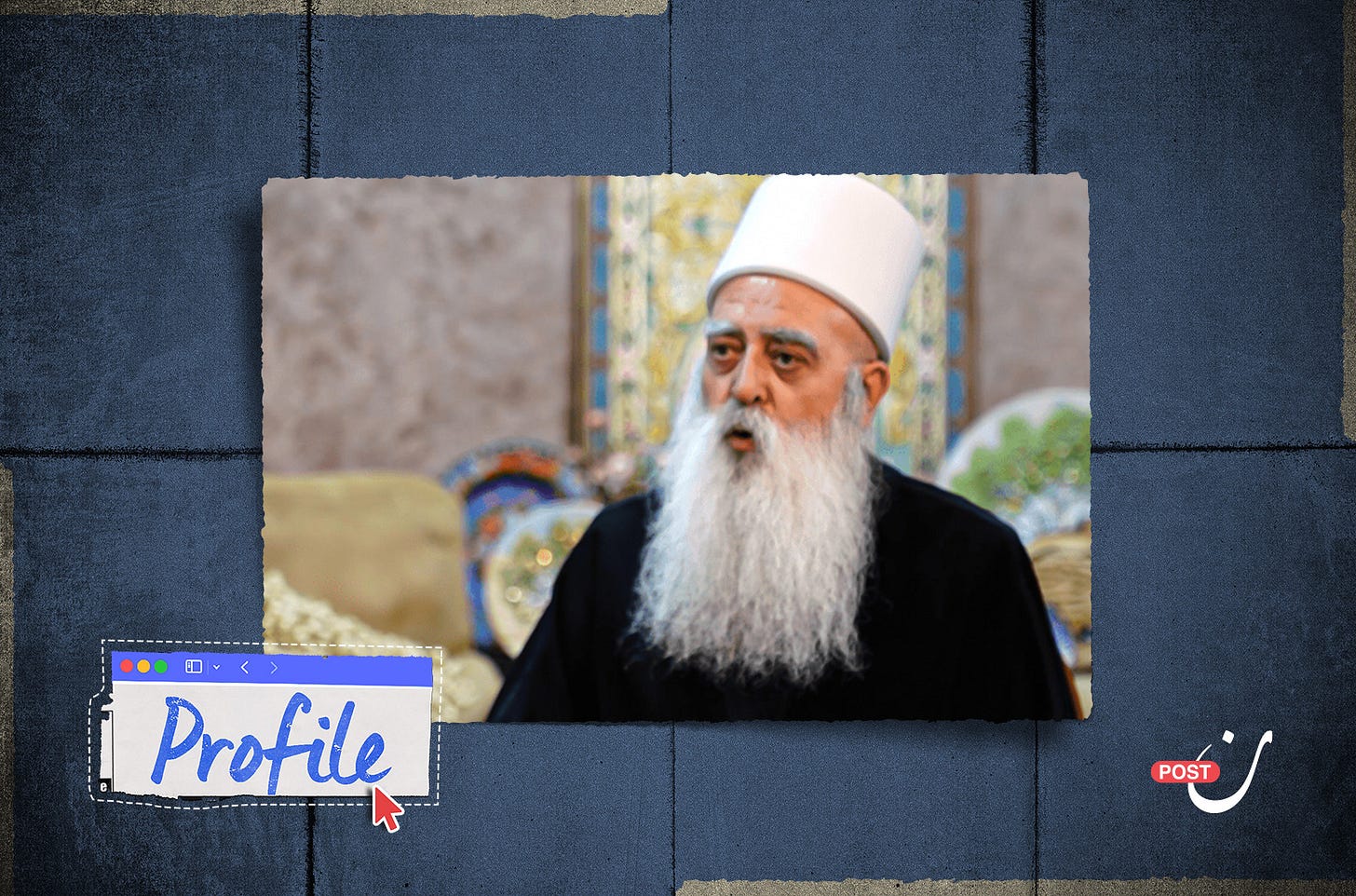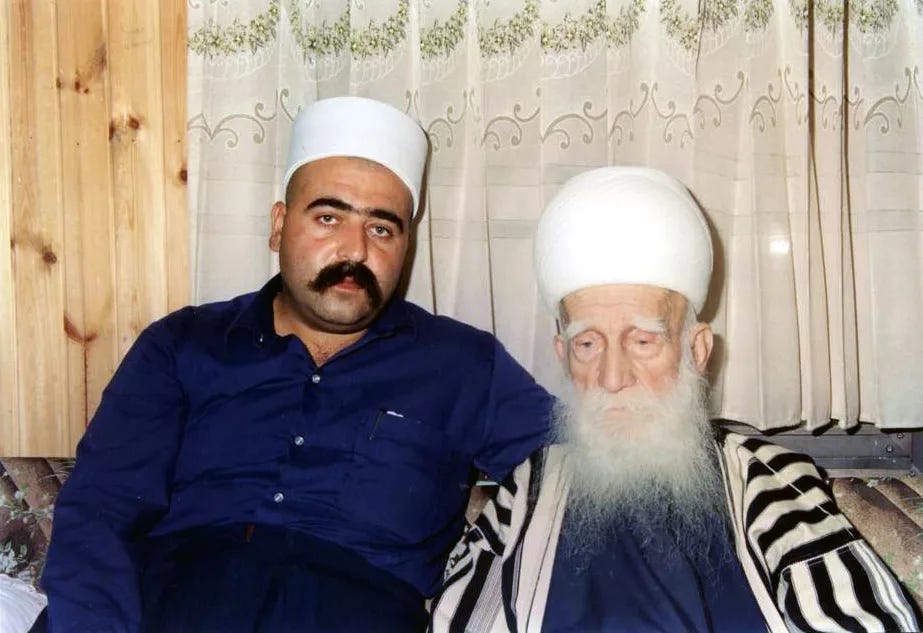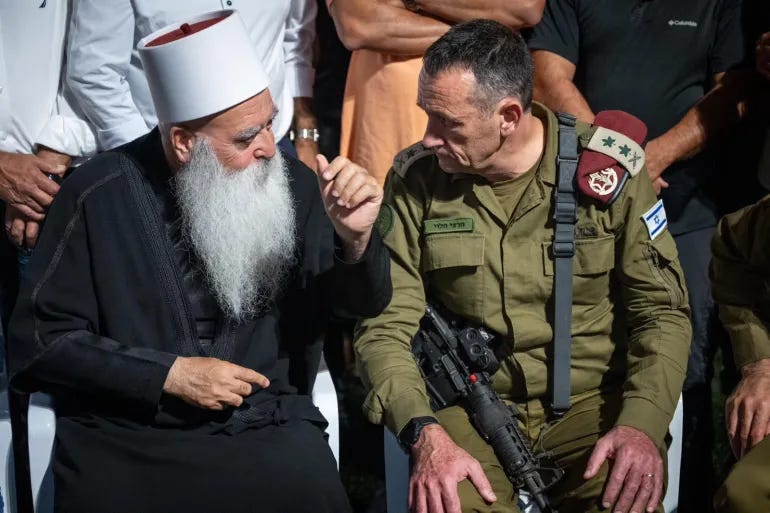In the summer of this year, the city of Suwayda witnessed one of the most dramatic episodes of tension in Syria, when local skirmishes between armed men led by Sheikh Hikmat al-Hijri—one of the Druze sect's spiritual leaders—and Bedouin residents escalated into a direct confrontation with Syrian security forces.
While Damascus appeared confident in its military superiority, its adversaries held a potent trump card capable of tipping the balance: the influence of Sheikh Muwaffaq Tarif, the highest spiritual authority for the Druze community in the occupied Palestinian territories. A religious leader cloaked in the spiritual garb of a "Ruhani," Tarif also acts as a political figure who skillfully leverages the symbolism of his position to serve a complex web of interests—even summoning Israel's air force at will.
In this context, Tarif's turban has transcended its spiritual symbolism to become a tool of political pressure in a game that exceeds sectarian boundaries. But beneath this image lie disquieting questions: Is he a spiritual leader trying to shield his community from erosion in a volatile region, or a pragmatic politician serving a broader Israeli agenda that views the Druze as a strategic asset?
Is his outreach beyond Israel an attempt to unify a scattered community, or merely a bid to cement his status as a supreme religious authority—even at the cost of subordinating himself to the occupation?
The Grandson Who Inherited the Druze Leadership
Muwaffaq Tarif was born in 1963 in the village of Julis in the Galilee, northern Israel. He descends from a well-known religious family historically tied to the leadership of the Druze sect. He succeeded his grandfather, Sheikh Amin Tarif, who led the Druze community in Israel for 65 years and was known for cultivating strong ties with the Israeli state from its inception.
Muwaffaq assumed leadership in 1993 based on a written will from his grandfather, who designated him as successor. He also took over custodianship of key religious shrines—including the tombs of Prophet Shu‘ayb and al-Khidr, and the Julis Khalwa—after serving as his grandfather's aide for 15 years, a process emblematic of the hereditary nature of Druze religious authority.
He completed his religious studies at the Higher Druze Religious School in Al-Bayada, Lebanon, and earned a law degree from Ono Academic College in Israel. In 2010, he was awarded an honorary doctorate from the University of Haifa.
On the institutional level, Tarif was elected head of the Supreme Druze Religious Council in 1997. He became an appellate judge in the Druze religious court in Acre in 2002 and was appointed chief judge in 2016.
His role extends beyond religious leadership and guardianship of holy sites; he also represents the Druze community in religious matters before Israeli institutions.
Over time, this status evolved into a form of political capital that Tarif has used to position himself as the community’s de facto spokesperson. Most Druze-related demands and negotiations now pass through him or his office, which has significantly expanded his unofficial power.
From Inherited Leadership to Political Influence
Tarif’s inherited authority and religious traditions have not only granted him symbolic legitimacy within the Druze community but also sustained his longstanding relationship with the Israeli state.
Since assuming leadership, he has maintained constant communication with various state bodies including the government and military—to defend what he calls "the rights of the Druze" and to promote their integration into Israeli society.
These connections include meetings with top Israeli officials. He is among the most prominent non-Jewish religious leaders to regularly meet with Prime Minister Benjamin Netanyahu, who has expressed interest in empowering the Druze through socio-economic policies.
Beyond his repeated meetings with the Israeli defense minister, former Air Force Commander Major General Amikam Norkin visited Tarif at the Druze House in Julis on December 28, 2018. Norkin affirmed, in his words, "Israel and its military's commitment to protecting Druze people wherever they are."
Such a statement, coming from the highest echelons of the military, was not merely a gesture of reassurance. It was a clear political signal that Israel views the Druze as a strategic asset, with Tarif serving as a conduit for advancing this narrative—far beyond his spiritual mandate.
This increasingly open relationship with the Israeli state has led some members of his community to accuse him of playing a dual role: combining the mantle of spiritual leadership with political justification for the Druze’s integration into Israel’s security and military apparatus. Critics argue that such alignment is rare among Druze clergy, both within and beyond Israel.
This dual role has gradually transformed the turban—traditionally a symbol of spiritual purity—into a political badge, granting Tarif access to decision-making circles in Tel Aviv and allowing him to play roles in matters well beyond his village or sect.
A Political Role Beyond Religious Leadership
Unlike his grandfather, who focused on internal community affairs, Tarif has aspired to broader roles that extend beyond religious authority. His outreach is not limited to Israeli institutions; he has also established consistent lines of communication with Russia. These moves suggest his desire to position himself as the Druze’s sole link to key regional players and to secure influence beyond Israel.
His repeated meetings with Russian Ambassador to Israel Anatoly Viktorov were more than ceremonial. They were part of an effort to use Russia’s influence in Syria to bolster his role in Druze affairs there. Critics interpreted these moves as more about enhancing his personal clout than sincerely advocating for Druze interests.
In December 2018, Tarif asked the Russian ambassador to deliver a message to Russian forces in Syria, urging coordination between the Assad regime and Druze leaders. The move appeared to position him as an indispensable mediator in any deal involving the Druze.
Two years later, he traveled to Moscow carrying a working paper on the Druze’s rights and future role in Syria. However, this visit sparked controversy, as critics pointed out that he had no mandate from Syrian Druze to speak on their behalf, and that his actions ventured far beyond his religious jurisdiction.
Nevertheless, the following year he proposed, during another meeting with the Russian ambassador, a mechanism for transferring aid from Druze in Israel to Suwayda via Russian mediation. The move was seen as an effort to establish political legitimacy outside Israel, backed by Moscow’s weight.
Despite his enthusiasm for building ties with Russia, most of his requests have remained confined to diplomatic communiqués and ceremonial meetings, never materializing into real outcomes. In effect, he has become more of a symbolic figure serving Russian interests than a player wielding substantive influence.
Tarif is also active on the global stage, frequently appearing at international forums where he presents himself as the voice of the Druze, especially in Syrian affairs. Yet this visibility also serves to solidify his personal influence, positioning him as a "global representative" of the Druze, and simultaneously as a back-channel for Israeli interests.
This became evident during his recent visit to Paris, where he met with the Druze diaspora in France and held talks with US Special Envoy for Syria Tom Barak. This meeting occurred just hours before Barak met with Syrian Foreign Minister Asaad al-Shibani and Israeli Strategic Affairs Minister Ron Dermer.
The timing of these meetings—the second of their kind in less than a month—suggests that Tarif’s activities are not merely personal or sectarian initiatives, but part of a broader web of unofficial communications facilitating Israel’s penetration of the Syrian scene and its outreach to international stakeholders.
Safeguarding the Druze or Subservience to the Occupation?
Tarif presents himself as a protector of the Druze community, but the Syrian uprising of 2011 revealed another side to his role. He leveraged the regional upheaval to expand his influence, casting himself as an intermediary between the Druze of Mount Lebanon and Israel. This role earned him the label of a "transnational representative," yet he went further, openly calling for Israeli military intervention in Syria to "protect the Druze."
Such calls sparked widespread debate about the limits of his religious authority, with critics questioning whether he truly serves the community or merely ties it to the occupation. Detractors argue that his stance makes Syrian Druze vulnerable to accusations by the Assad regime of collaborating with Israel.
Following the fall of Bashar al-Assad in Syria, on March 14, 2025, Tarif coordinated a visit by around 60 Druze religious figures from Syria to Israel—crossing the armistice line in the occupied Golan Heights. It was the first such visit in over half a century.
The visit raised numerous questions about its motivations and consequences, especially amid escalating Israeli efforts to woo the Druze and the accompanying divisions among spiritual leaders and Druze factions in response to Syria’s new political landscape.
When violent clashes erupted again in Suwayda in July, Tarif made frequent appearances in Israeli media, urging the Israeli military to intervene in Syria under the pretext of protecting the Druze and supporting his ally, Sheikh Hikmat al-Hijri, in their fight against the Syrian government.
His lobbying served as both justification and a moral cover for Israel to deepen its incursions into Syria. Israeli forces bombed multiple targets in central Damascus, including military headquarters near Umayyad Square—sparking a storm of criticism and accusations against both al-Hijri and Tarif.
While Tarif publicly frames his efforts as humanitarian, some Druze see things differently. In Lebanon, for example, political leader Walid Jumblatt accuses him of being backed by Zionist forces and pursuing a divisive agenda aimed at fragmenting the Druze community.
Serious questions arise about the nature of Tarif’s ambitions. He claims to advocate for Druze integration in Israeli society while preserving their religious and cultural identity. But his critics argue that his project aligns with an agenda that doesn’t represent the Druze at large and instead serves to cement his own standing with the Israeli establishment.
Many Druze in Syria view his close relationship with the Israeli authorities as a threat to their national identity. When he visited Suwayda in September 2018, some residents saw his presence as a betrayal due to his Israeli citizenship.
They argue that Tarif’s visibility during moments of crisis harms their reputation and undermines the national narrative the Druze have embraced since the Syrian uprising. They fear that his ties to Israel could cast doubts on their loyalties, especially amid the ongoing occupation of the Golan and Palestinian territories.
Even some Israeli circles acknowledge that direct involvement in Druze conflicts in Syria could drag Tel Aviv into sectarian strife, which would not serve Israeli interests. Nonetheless, Israel continues to use Tarif as a tool to advance its objectives in Syria, while he, in turn, leverages the relationship to pursue his ambition of becoming a regional Druze leader.
In July, the Israeli daily Yedioth Ahronoth revealed that Druze leaders in Israel had been urgently summoned to a meeting with top military and intelligence officials, including Deputy Chief of Staff Tamir Yadai and Northern Command head Uri Gordin—a scene that highlighted the deep intertwining of religious and military institutions.
But some attendees, such as Daliyat al-Karmel Mayor Rafik Halabi, left disappointed by what they saw as empty Israeli rhetoric, suggesting a growing rift between the state's assurances and the reality of Druze subordination.
Israel’s Preferred Pragmatist
The gap between Muwaffaq Tarif’s rhetoric and actions is glaring. Though he is portrayed as a spiritual leader, many see him as a pragmatist who ensures communal interests through his closeness to the Israeli establishment—a relationship that brings the Druze security, economic opportunities, and public services.
Why does Israel treat him with such distinction? Because Tarif serves as a symbolic exception: a minority religious leader embraced by the state as proof of Druze loyalty to the Zionist project. By showcasing him, Israel attempts to draw the Druze into regional conflicts in which they have no stake.
Israel portrays Tarif as the head of a "loyal, fighting minority," granting him honors usually reserved for Jewish leaders such as participation in military and civil ceremonies. Mandatory conscription further cements this image, turning him into a symbol of minority allegiance, which serves both domestic and international Israeli narratives.
In April 2018, Tarif was chosen to light a ceremonial torch during Israel’s 70th Independence Day celebration a role underscoring his openness to state events, despite the identity-related challenges this poses for the Druze.
This symbolic coronation fits into Israel’s long-standing narrative of coexistence and loyalty—a narrative dating back to the 1950s, when the so-called "blood pact" was coined to describe the alliance between Jewish and Druze soldiers in the Israeli army.
While Sunni Arabs and Christians were excluded from conscription, many Druze leaders helped enforce it, driven by the promise of improved socio-economic conditions and a stronger position within Israeli society.
Unlike other Palestinians in Israel, the Druze have been integrated into a unique security and political relationship with the state. Whenever Israel needs a strong Druze figure to uphold this dynamic even in times of internal dissent, like during the 2018 Nation-State Law protests Tarif is there to temper unrest.
Despite widespread Druze outrage over the law, which they saw as enshrining second-class citizenship, Tarif pushed for dialogue and restrained protest, thus helping manage the crisis in ways that aligned with state interests.
More importantly, Tarif remains Israel’s most convenient figure for justifying intervention in Syrian affairs. His voice resonates in Tel Aviv’s political and military circles, largely because of his influence over Druze populations in both the Galilee and Golan.
But his role is increasingly under scrutiny. Domestically, he faces rising opposition from young Druze who see his cooperation with Israeli authorities as putting the community at the service of an exclusionary Jewish state. Regionally, his efforts to become the paramount Druze leader clash with deep skepticism among Druze in Syria and Lebanon.





